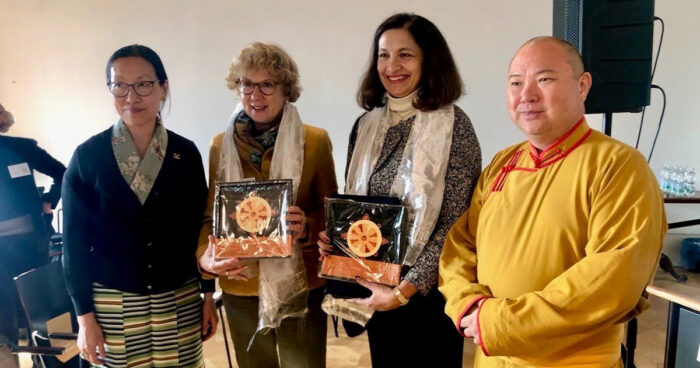
PRAGUE—Telo Tulku Rinpoche, the representative of His Holiness the Dalai Lama to Mongolia, Russia and the Commonwealth of Independent States, delivered remarks here at the 5th International Religious Freedom or Belief Alliance Ministerial Conference.
The topic of the conference this year was “Freedom of Religion or Belief under Authoritarian Regimes.” Telo Tulku Rinpoche spoke in the first session on “Misuse of Religion for Political Purposes and Building Resilience.” He addressed the influence of Tibetan Buddhism in Asia and China’s repressive policies against the Tibetan Buddhist community in Tibet.
International Campaign for Tibet President Tencho Gyatso, who also attended the conference, said: “ICT appreciates that this important international conference gives a prominent place to the situation of Tibetan Buddhism, which is severely threatened and is being Sinified by China in particular under the leadership of President Xi. Governments should work multilaterally with like-minded countries and international bodies, including the EU and the International Religious Freedom or Belief Alliance, to undertake coordinated initiatives in developing a united policy on religious freedom of the Tibetan people, including at the UN and other international and regional fora.”
The conference was attended by several important leaders, including Jan Lipavský, minister of foreign affairs of the Czech Republic; Fiona Bruce, the British prime minister’s special envoy for freedom of religion or belief and chair of the International Religious Freedom or Belief Alliance, as well as a member of the British Parliament; and Nazila Ghanea, UN special rapporteur on freedom of religion or belief.
Side event on Dalai Lama’s vision
On Nov. 29, ICT, together with Czechs Support Tibet, organized a side event to the ministerial conference titled “A Path Forward to Peace and Stability in Asia and the World: The Vision of the Dalai Lama.”
The objective of this event was to discuss the transformative power of Buddhism, in particular under the vision and leadership of His Holiness the Dalai Lama, and the beneficial cultural influence that Tibet has historically exerted over Asia, India, China and Russia and how it can further contribute to peace and stability in a region increasingly marked by tensions.
The opening remarks were delivered by ICT President Tencho Gyatso and were followed by statements by the two guest speakers, US Under Secretary of State for Civilian Security, Democracy, and Human Rights and Special Coordinator for Tibetan Issues Uzra Zeya; and Special Envoy for Freedom of Religion and Conviction of the Netherlands Bea ten Tusscher.
Zeya said: “We will continue to increase international solidarity and support of Tibetans human rights and preservation of their unique cultural, religious and linguistic identity. (…) We continue to call on the PRC to resume meaningful and direct dialogue with the Dalai Lama or his representatives without preconditions at the highest levels of our government.”
Ten Tusscher said: “Universal freedom of religion does not allow for politicization, and spiritual decisions are up to spiritual leaders, the Dalai Lama and his followers, and not to politicians. It should not be used as a weapon.”
Petr Jan Vinš Czech, a theologian, priest and translator, was among the panelists and raised how religion can be a force of resistance against authoritarian regimes.
ICT Head of Research and Monitoring Bhuchung Tsering addressed the topic of “challenges and opportunities in addressing freedom of religion in Tibet under the surveillance and control of the Chinese Communist Party.” He called in particular on governments and the International Religious Freedom or Belief Alliance Ministerial Conference to publicly support the traditional spiritual authority of the Dalai Lama and Tibetan Buddhists and counter Chinese interference in matters relating to Tibetan Buddhism, particularly in the reincarnation process, and consider imposing sanctions with respect to such Chinese officials who are involved.
Ministerial
The Ministerial to Advance Religious Freedom is an event organized under the International Religious Freedom or Belief Alliance (IRFBA), a network of 37 like-minded countries committed to advancing freedom of religion or belief around the world. The initiative was launched in 2018 by the US. There have been four prior conferences: in 2018 and 2019 in the United States, in 2020 in Poland, and in 2022 in the UK.
Read the full testimony of Tulku Telo Rinpoche at the Ministerial.

